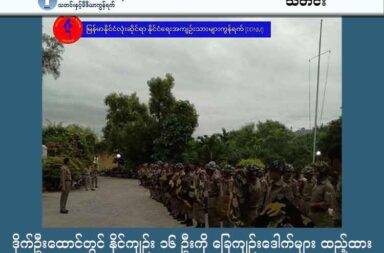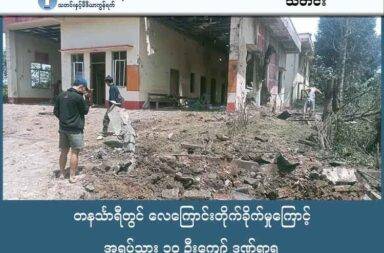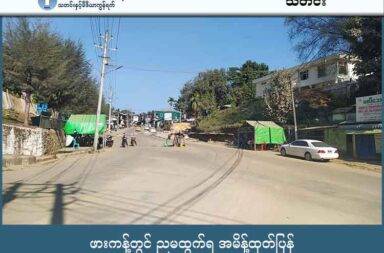Armed Groups Vow to Continue Fight for Democracy
The struggle against military dictatorship continues, said armed-group leaders on the anniversary of the “four eights” uprising.
By NETWORK MEDIA GROUP
Saturday, August 10, 2019
Armed groups based in northern Burma vowed on Thursday to continue their struggle against military dictatorship as they marked the 31st anniversary of the “four eights” uprising at a ceremony held near Laiza, the headquarters of the Kachin Independence Organization (KIO).
Despite a political transition to civilian rule in recent years, the groups said that the military’s control over the country remains very much alive and must be overcome completely before the pro-democracy movement launched on August 8, 1988, can be called a success.
“We are still struggling against the dictatorship, because it still exists to this day, just in a different form,” said La Seng, the chairman of the All Burma Students’ Democratic Front—Northern Burma (ABSDF-NB), in an opening speech delivered at the ceremony.
Brig.-Gen. Zau Tawng, a central committee member of the KIO and chief of staff of its military wing, the Kachin Independence Army (KIA), echoed La Seng’s views.
“The 8-8-88 people’s uprising took down the one-party dictatorship, but we are still facing challenges under a different kind of military dictatorship. Military rule still exists in Burma,” he said, adding that army interference in politics lies at the heart of all of the country’s political problems.
“As we known, military dictatorship is the root of all domestic political problems. Therefore, we will have to keep fighting the military dictatorship until it is brought to an end,” Brig.-Gen. Zau Tawng said.
ABSDF Chairman Than Khe blamed the failure to achieve total victory in the struggle for real democracy on a lack of cooperation among ethnic armed organizations and pro-democracy forces.
“There was no unity among different political organizations. Another thing is that we did not make bold decisions during the transition period. I think we lost many things because we could not act bravely,” said Than Khe, recalling the situation in 1988.
According to Than Khe, the people called for formation of an interim government during the 1988 uprising, but political leaders failed to achieve this. If they had succeeded in pulling together, the outcome of the uprising would have been very different, he said.
The goal of the ABSDF is not just to end military rule, but to achieve genuine peace and human rights, and to guarantee the freedom of all of Burma’s oppressed ethnic people, said La Seng of the ABSDF-NB.
“The establishment of a genuine federal union is now the ultimate goal of the ABSDF. We haven’t achieved this goal until today. Therefore, the student army will continue struggling. We promise that we will keep fighting until we reach our goals,” he said.
The Kachin State-based ABSDF-NB commemorated the 31st anniversary of the 1988 uprising at its headquarters in Janghtung Lahkum Bum, near Laiza, on August 8. The event was attended by KIO/KIA officials, ABSDF leaders and rank-and-file members, and local people.


